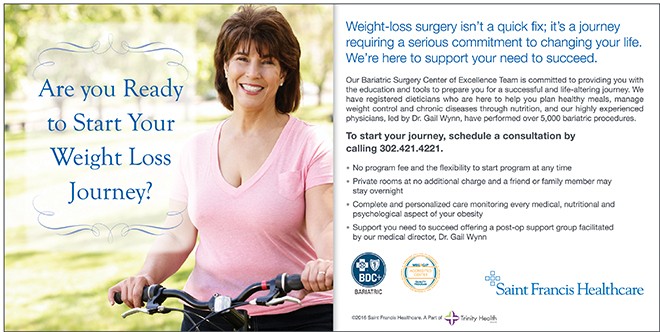Health Care After Menopause
 By James J. Cosgrove, DO, FACOG, Department Chairman
By James J. Cosgrove, DO, FACOG, Department Chairman
Obstetrics and Gynecology, Saint Francis Healthcare
Volumes have been written for women on how to manage the challenges associated with pregnancy, perimenopause and menopause. What is often overlooked is the importance of actively maintaining good health later in life, after the children have grown, the hot flashes are over and insomnia has settled down. As with previous life stages, it’s important to continue seeing medical professionals and pursuing a healthy lifestyle.
A common question for post-menopausal women is whether previous medical evaluations, such as Pap smears, mammography, colonoscopy and annual physical exams, are still required. The answer is yes, with some modifications.
Medical Evaluations for Post-Menopausal Women
• The Pap smear is needed only once every five years if previous Pap tests have been normal. If you are between the ages of 65 and 70, or if you have had a hysterectomy, Pap tests can be eliminated altogether. This does not mean, however, that a pelvic examination should be eliminated. The pelvic examination must continue yearly.
• Post-menopausal women should receive annual mammograms. Some insurance programs will only reimburse mammography every two years after the age of 65, so be sure to check with your carrier to avoid unexpected costs.
• Routine screening colonoscopies should begin at age 50 for low-risk patients, while those with a family history of colon cancer will be sent by their doctor for earlier testing. Repeat colonoscopies will usually be completed every three to 10 years, depending on your family history and previous colonoscopy results.
• A yearly examination for the basics, including blood pressure, heart, lungs, abdomen and pelvis should be completed along with diabetic testing, cholesterol screening and eye examinations. These very important tests help identify minor problems before they become serious health issues.
Disease vs. Illness
As women age, it is inevitable that some organs will become diseased. But there is an important difference between disease and illness. Disease is a physical anomaly in the body, while illness is the emotional, social and physiological change that occurs when an organ has become diseased.
For example, a lung may become diseased with cancer, perhaps from years of tobacco use, which may require surgery, radiation, or chemotherapy. The illness associated with this disease may be the inability to enjoy grandchildren due to difficulty breathing or the frustration of decreased mobility.
While diseases cannot always be prevented, addressing them quickly limits the impact of the illness on your everyday life. For women beyond menopause, the best way to do this is to continue the routine check-ups, exercise regularly and maintain a healthy diet.
After age 50, your diet will change as a result of decreased sensitivity of the taste buds, and a decreased desire for fluids. Nonetheless, those over 50 must increase their drinking of fluids, especially water, even when they do not feel thirsty.
It is never too late to begin an exercise program. One study showed that women beyond menopause, who previously did not exercise and began light weight lifting two times per week, improved bone mass, muscle mass, felt more energetic and were less likely to develop medical conditions as readily as their non-exercising peers.
Generally exercise for women beyond menopause should include balance training, muscle strengthening, endurance training and flexibility.
Some exercise routines can be vigorous, increasing heart rate and building muscle. However, exercise can be as simple as walking, yoga, or Tai Chi. These exercises will help you avoid fall related injuries, improve mobility, prevent disease, and keep your mind healthy. Some reports even indicate as high as a 50 percent reduction in the mortality rates of those that do regular exercise.
Staying Healthy with Exercise
Here are some exercise suggestions for post-menopausal women:
• Aerobic Exercise: Increase heart rate by walking 20-30 minutes daily.
• Muscle Strengthening: Increase muscle tone with light weight training. Women should lift 2-5 lb. hand weights, 2-3 times per week.
• Flexibility: Increase muscle-bone synergy and strength with yoga or Tai Chi.
• Balance: Maintain gait/steadiness by walking “heel to toe” in a line, or placing a 4-inch wide piece of wood on two bricks and walking across the board twice a week. This is much like when children walk on a curb and develop a sense of balance.
Be sure to speak with your doctor or trainer to develop an appropriate exercise and diet plan that meets your special needs. Always remember to ask for input from your doctor concerning your personal health limitations. If women beyond menopause eat a healthy diet, exercise, and continue regular health screening and testing as recommended, they will not only delay the onset of disease, but, more importantly, can reduce or eliminate the illness associated with disease. The benefits of a healthy lifestyle do not end with menopause. Improve your tomorrow, by making good decisions about your diet, exercise routine, and healthcare today.
If you would like to discuss post-menopausal care with a Saint Francis Healthcare physician, please call the Saint Francis OB/GYN Center at 302.421.4775.

Photo by Shannon Adelson, Adelson Media, Inc.




